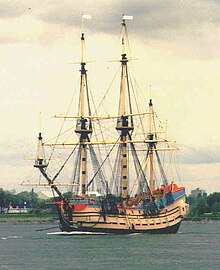Battle of Hudson's Bay: Difference between revisions
m r2.7.1) (Robot: Adding ja:ハドソン湾の戦い |
Eulalie Écho (talk | contribs) mNo edit summary |
||
| Line 23: | Line 23: | ||
{{Campaignbox King William's War}} |
{{Campaignbox King William's War}} |
||
The '''Battle of Hudson's Bay''', also known as the '''Battle of York Factory''', was a naval battle fought during the [[Nine Years' War|War of the Grand Alliance]] (known in |
The '''Battle of Hudson's Bay''', also known as the '''Battle of York Factory''', was a naval battle fought during the [[Nine Years' War|War of the Grand Alliance]] (known in England's North American colonies as "[[King William's War]]"). The battle took place on 5 September 1697,<ref name="Andra-Warner2009">{{cite book|author=Elle Andra-Warner|title=Hudson's Bay Company Adventures: The Rollicking Saga of Canada's Fur Traders|url=http://books.google.com/books?id=3iXIqHDnIs4C&pg=PA74|date=15 August 2009|publisher=Heritage House Publishing Co|isbn=978-1-894974-68-4|page=74}}</ref> when a French warship commanded by [[Captain (naval)|Captain]] [[Pierre Le Moyne d'Iberville]] defeated an [[Kingdom of England|English]] squadron commanded by Captain John Fletcher. As a result of this battle, the French took [[York Factory, Manitoba|York Factory]], a trading post of the [[Hudson's Bay Company]]. For other fighting in the region see [[Anglo-French conflicts on Hudson Bay]]. |
||
==Prelude== |
==Prelude== |
||
Revision as of 18:20, 4 July 2012
| Battle of Hudson's Bay | |||||||
|---|---|---|---|---|---|---|---|
| Part of the War of the Grand Alliance | |||||||
 The Sinking of the Pélican, after a 1722 print by Claude-Charles Bacqueville de La Potherie. | |||||||
| |||||||
| Belligerents | |||||||
|
|
| ||||||
| Commanders and leaders | |||||||
| Pierre Le Moyne d'Iberville | John Fletcher | ||||||
| Strength | |||||||
|
1 frigate
|
3 frigates
| ||||||
| Casualties and losses | |||||||
| 1 ship damaged and later lost |
1 ship sunk 1 ship captured | ||||||
The Battle of Hudson's Bay, also known as the Battle of York Factory, was a naval battle fought during the War of the Grand Alliance (known in England's North American colonies as "King William's War"). The battle took place on 5 September 1697,[1] when a French warship commanded by Captain Pierre Le Moyne d'Iberville defeated an English squadron commanded by Captain John Fletcher. As a result of this battle, the French took York Factory, a trading post of the Hudson's Bay Company. For other fighting in the region see Anglo-French conflicts on Hudson Bay.
Prelude

D'Iberville's flagship, the Pélican (44-guns), was part of a larger French squadron dispatched to contest English control of Hudson Bay.[2] Before the battle, the Pélican became separated from the rest of the French squadron in heavy fog, but D'Iberville elected to forge ahead. This set the stage for a little-known but spectacular single-ship action against heavy odds.[2]
As the Pélican sailed south into clearer weather, she approached the trading post of York Factory, and a group of soldiers went ashore to scout out the fort. Captain D'Iberville remained on board the Pélican. While the shore party was scouting the fort, D'Iberville saw the sails and masts of approaching ships. Thinking the rest of his squadron had arrived, he set off to meet them. In short order, D'Iberville realized that the ships were not French, but were, instead, an English squadron comprising the warship Hampshire (56 guns) and two armed merchantmen, the Dering (36 guns) and the Hudson's Bay (32 guns).
The battle
D'Iberville, his shore party out of reach, elected to give battle. The battle began as a running fight, but after two and a half hours, D'Iberville closed with the English and a brutal broadside-to-broadside engagement took place between the Pélican and the Hampshire. The English seemed to be gaining the upper hand with blood running from the scuppers of the Pélican into the water.[3] Captain Fletcher demanded that D'Iberville surrender, but D'Iberville refused.[4] Fletcher is reported to have raised a glass of wine to toast D'Iberville's bravery when the next broadside from the Pélican detonated the Hampshire's powder magazine.[5] The Hampshire exploded and sank.
Aftermath
The Hudson's Bay and the Dering seem to have played only a limited supporting role in the final stage of the engagement. The Hudson's Bay was damaged and struck its colors to Pélican after the Hampshire blew up. Dering broke off the engagement and fled, but the Pélican was too badly damaged to pursue.
The Pélican was also fatally damaged in the battle. Holed below the waterline, the Pélican had to be abandoned, but the arrival of the remainder of the French squadron shortly thereafter led to the surrender of York Factory on September 13, 1697, and the continuation of D'Iberville's remarkable career.[2]
References
- ^ Elle Andra-Warner (15 August 2009). Hudson's Bay Company Adventures: The Rollicking Saga of Canada's Fur Traders. Heritage House Publishing Co. p. 74. ISBN 978-1-894974-68-4.
- ^ a b c Anthony Dalton (1 May 2011). The Fur-Trade Fleet: Shipwrecks of the Hudson's Bay Company. Heritage House Publishing Co. p. 22. ISBN 978-1-926936-09-3.
- ^ François-Xavier Garneau (1876). History of Canada from the time of its discovery till the union of 1840-41. Belford Brothers. p. 356.
- ^ Mary Beacock Fryer (1993). More battlefields of Canada. Dundurn Press Ltd. p. 25. ISBN 978-1-55002-189-9.
- ^ Peter Charles Newman (August 2000). Empire of the bay: the company of adventurers that seized a continent. Penguin Books. ISBN 978-0-14-029987-8.
External links
- Pierre Le Moyne d'Iberville - Dictionary of Canadian Biography Online
